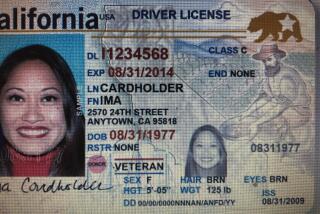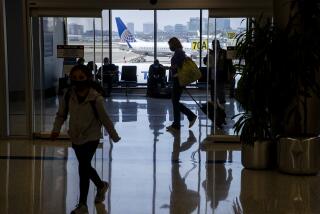Rules finalized for national ID
- Share via
WASHINGTON — Americans born after Dec. 1, 1964, will have to get more secure driver’s licenses in the next six years under ambitious post-9/11 security rules to be unveiled today by federal officials.
The Homeland Security Department has spent years crafting regulations for the Real ID Act, a law designed to make it harder for terrorists, illegal immigrants and con artists to get government-issued identification. The effort once envisioned to take effect in 2008 has been pushed back in the hope of winning over skeptical state officials.
Even with more time and technical advances, Real ID still faces stiff opposition from civil liberties groups.
To address some of those concerns, the government now plans to phase in a secure-ID initiative that Congress passed into law in 2005. Now, Homeland Security plans a key deadline in 2011, with further measures to be enacted later.
Without discussing details, Homeland Security Secretary Michael Chertoff promoted the final rules for Real ID during a meeting Thursday with an advisory council. “We worked very closely with the states in terms of developing a plan that I think will be inexpensive, reasonable to implement and produce the results,” he said.
In order to make the plan more appealing to states, federal authorities drastically reduced the expected cost, according to Homeland Security officials.
The American Civil Liberties Union has fiercely objected to the effort, particularly the sharing of personal data among government agencies.
By 2014, anyone seeking to board an airplane or enter a federal building would have to present a Real ID-compliant driver’s license, with the notable exception of those older than 50, Homeland Security officials said.
The over-50 exemption was created to give states more time to get everyone new licenses. By 2017, even those older than 50 must have a Real ID-compliant card to board a plane.
More to Read
Sign up for Essential California
The most important California stories and recommendations in your inbox every morning.
You may occasionally receive promotional content from the Los Angeles Times.










